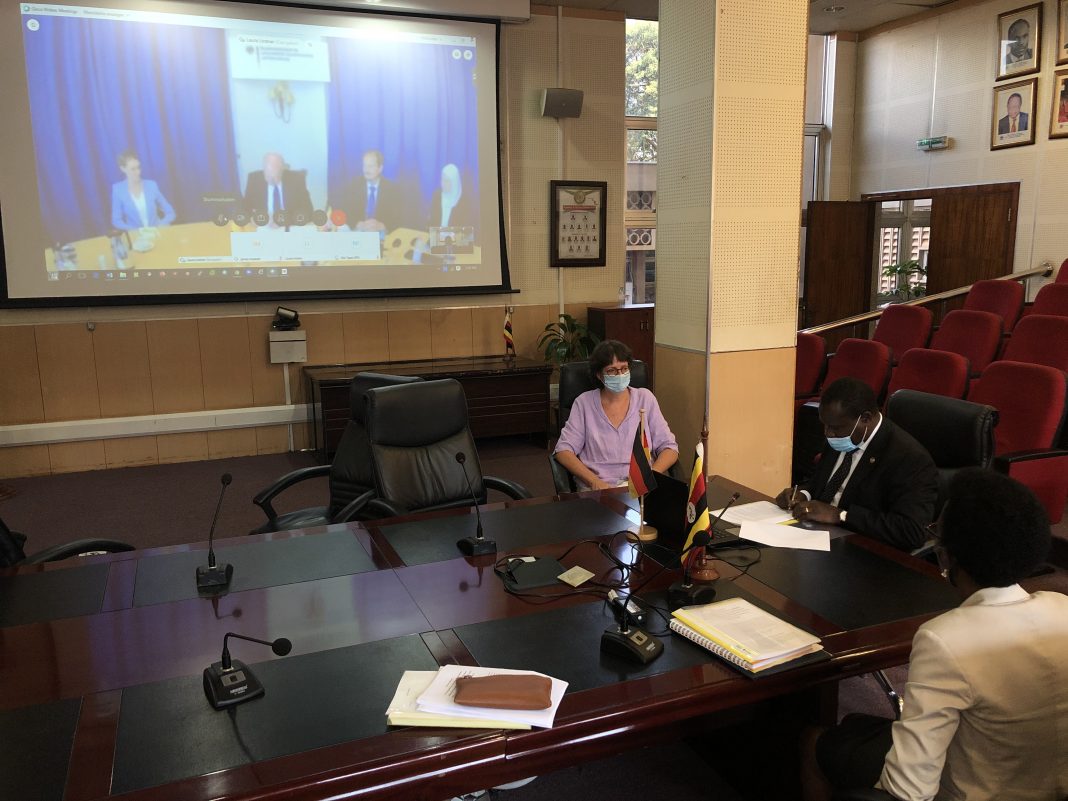Uganda and Germany today successfully concluded government negotiations on the framework for development cooperation for the next two years. Germany committed a total of EUR 58.4 million in grants. Another EUR 15.0 million in grants is envisaged for the public finance management reform programme following the approval of the German Parliament. In addition, Germany is a main contributor to multilateral emergency funds aiming to mitigate the effects of the Coronavirus pandemic.
Germany extended and up scaled the bilateral cooperation with Uganda concentrating on the two focus areas Renewable Energy and Agriculture and Rural Development as well as the area Good Governance and Human Rights. German cooperation aims at fostering Uganda’s sustainable development by e.g. creating job perspectives for the youth, promoting private sector development, enhancing access to electricity or by promoting civil society as well as fiscal management. German cooperation has also included measures to mitigate the Coronavirus pandemic, also through multilateral actors.
In the field of agriculture, Germany contributes in particular EUR 20.0 million to enhance access to affordable credits for small and medium enterprises (SMEs). This is essential for agricultural enterprises in their efforts to develop their businesses, increase productivity and to create incomes as well as employment opportunities in rural areas, especially for the youth. In addition, Germany is upscaling its support to local administrations with the aim of enhancing their service delivery function and to farmers with the goal of fostering their market integration. Furthermore programme activities to securing land rights as well as sustainable fisheries management were extended.
Germany allocated the amount of EUR 19.8 Million for support to refugee hosting communities including EUR 16.8 million to improve the provision of water and sanitation services in refugee hosting communities.
Germany will continue the promotion of renewable energy. There will be increased support to SMEs regarding access to renewable and efficient energy technologies as well as deepened promotion of mini-grids to bring electricity to marginalized villages far off from the national grid. The cooperation with vocational training institutes will be enhanced to increase the number of skilled electricians and solar technicians.
Germany intends to increase the support to Uganda’s public financial management reform programme (REAP) by EUR 15.0 million. This measure is still subject to approval of the German Parliament. The allocation is destined for strengthening domestic resource mobilization as well as creating a sound financial system based on efficiency, transparency and accountability, thereby improving Uganda’s capacities to foster sustainable development. An additional EUR 9.0 million will be provided to support the areas of anti-corruption, accountability and transparency in public finance management as well as strengthening human rights and civil society.
Germany’s bilateral programmes are implemented by GIZ and KfW. All initiatives support Uganda in implementing its National Development Plan III, the United Nations’ Agenda 2030 and the Agenda 2063 of the African Union.
The negotiations – as a result of the Corona pandemic held via videoconference between Kampala and Bonn – paved the way for the Ugandan-German development cooperation in the period from 2021 to 2022. The talks were concluded by the signing of joint summary records on 29 July 2020 by Mr. Patrick Ocailap, Deputy Secretary to the Treasury, MoFPED, for the Ugandan side and by the head of East Africa Division of the Federal Ministry of Development Cooperation, Mr. Niels Breyer, as head of the German Delegation.








